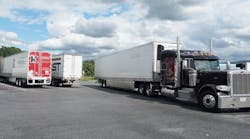The full Food and Drug Administration’s (FDA) Food Safety Modernization Act (FSMA) sanitary transportation compliance date for all impacted parties is April 6 of this year. Yet many carriers already have been required to follow the new guidelines for the past year or so.
But even with the best practices put in place, fleets could still be at risk of load contamination if their trucks have been targeted by cargo thieves.
“A lot of times cargo thieves want to ‘shop’ the loads first,” explained Scott Cornell, transportation business lead and crime and theft specialist at Travelers. “They may just go to a place where they know there are a lot of trucks stopped or regularly parked, and they’ll just start ‘shopping the loads.’ When they do that, they’ll break the seal, they’ll open the back of the trailer, and they’ll see what’s in it to decide if there’s something they want to take or not.”
The FDA finalized its new food safety rule back in April 2016 to prevent food contamination during transportation. Small businesses other than motor carriers that are not also shippers and/or receivers still have until April 6 to comply with the regulation. Other businesses that were not otherwise excluded from coverage had to comply by April 2017.
The rule establishes requirements for ensuring food is properly refrigerated, that vehicles and equipment are properly cleaned and sanitized, and ensuring food is protected during transport. It does not, however, address food or trailer security, such as seals and locks.
FDA regulations note that even though a broken or tampered with seal or trailer lock doesn’t necessarily constitute an insurance or contamination claim for carriers, it immediately sets off red flags. With a broken seal, carriers begin to question whether the load had been contaminated, or if the temperature within the trailer had been altered.
From an insurance perspective, Travelers recommends that companies use high-security seal locks – locking devices that can be removed or attached physically to the trailers and go over the seal to protect the integrity of the load. These locking devices could also better prevent cargo thieves from tampering with the seal and then “shopping” the load.
Cornell pointed out that another viable alternative to keeping loads safe from contamination is installing high-security rear-door locks on the trailer.
“You want to have both of those layers, but one is better than none,” he stressed. “We advise clients on areas of the country that are high theft areas and areas they may want to avoid or take extra precautions around. Are you training your drivers? Are you parking in a well-lighted area? When you’re staging your loads, is there a secure lot you can stage your load in?”
Cornell emphasized that it all goes back to education and communication between fleet managers and their drivers. He suggested management discuss safe parking practices with their drivers – like parking in well-lighted, highly populated areas.
Furthermore, Cornell suggested carriers think about taking trailer security to the next level with covert tracking devices, which can track loads in real-time and before a potential theft occurs. He added that many of those devices monitor trailer temperature as well.
Overall, the rules require improvement to procedures involving sanitation and temperature controls designed to prevent adulteration of human and animal foods during transportation processes. Substantial written agreements between shippers and carriers must also be established, and new documentation systems must be put in place to provide evidence of compliance.
Compliance for carriers now requires:
- Written standard operation procedures for the cleaning and inspection of vehicles.
- A developed safety plan that focuses on the transportation of food.
- Mandatory training for all transportation operations personnel (loaders, unloaders, drivers, supervisors). Training certificates should be kept on file.
- A thorough review of contracts to determine if the general sanitation responsibilities have been reassigned to them by the shipper or if the shipper is still bearing those responsibilities.
- Employee training based on the regulations and around the sanitization of equipment.
“This has had a broad impact for our clients,” Cornell explained. “Many of our clients already have the best practices in place, and they already operate under these best practices. But now a lot of those best practices are being mandated by the regulation.”





